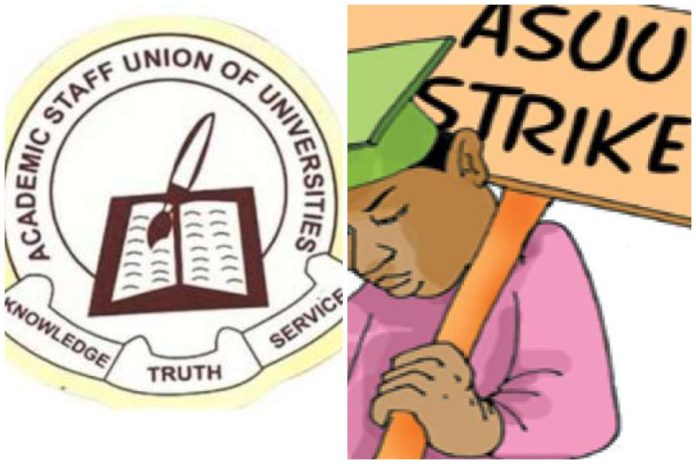By: Busayo Adeyemi
The Academic Staff Union of Universities (ASUU) strike has brought significant changes to students’ well-being, making them more independent and self-employed.
This was due to the federal government’s failure to respond to the introduction of the Integrated Payroll and Personnel Information Systems (IPPIS), which ASUU claimed would undermine university autonomy.
According to a report by The Punch, the Academic Staff Union has embarked on 16 strikes since August 7, 1988, when it first protested against the regime of General Ibrahim Babangida.
Similar analysis in the same report revealed that while ASUU has gone on strike 16 times since 1999, it continually blamed the government’s failure to meet its demands.
The strike disrupted the academic calendar, forcing the management to fit three semesters into one year just to make up for lost time. It also contributed to delays in clearance, graduation, and processing of results.
The strike had broader social and economic impacts on students, families, and the wider community. It resulted in academic decline, hindering students’ progress and development.
However, it also contributed to students’ productivity, as they learned new skills, gained insights from attending fellowship programs and seminars, and explored entrepreneurial ventures.
From Bricklaying to Business
Self-employment has become a trend among university undergraduates due to the scarcity of white-collar jobs in Nigeria. Many students became self-employed and independent while still in school. Some started online tutoring, e-commerce, content creation, and offering services to their peers due to their dedication, resilience, and adaptability, which increased their chances of success.
Speaking with Adelabu Olamide, he mentioned that he was unable to pay his school fees, but during the ASUU strike, he engaged in activities like bricklaying and other hustles to gather money. With the income he earned, he started a roadside food business at night, selling indomie and akara.
He also learned to be an electrician, which has helped him earn extra money. This side hustle continues to support him in paying his school fees.
In an interview with Jenty Henry, a student of AAUA, he said that during the strike, he had the opportunity to learn new skills such as communication and graphic design. He also retreated to read books and engaged in personal development initiatives while building his ‘FHG’ business.
The Faith Heroic Generation (FHG) business is a combination of network marketing and online ventures. He also learned more about freelancing during this time.
Also, in a conversation with Akinrolabu Oluwatobi Marvelous, he highlighted that the ASUU strike, which came eight months after the COVID-19 pandemic, extended his four-year course into five years. During the strike, he learned graphic design, which he now uses, including for church programs.
Famuti Ayomide, another student, shared how the ASUU strike affected his university journey.
He had been skilled in cinematography before getting admission and had initially thought the strike wouldn’t last long. However, as the strike continued to be extended, he resumed assisting his boss in cinematography work, which provided him with upkeep. He also acquired more skills, particularly in capturing images for film, television, and digital media.
Instability in Nigeria Drives Students to Self-Employment- Expert
According to Daily Trust, Dr. Muhammad Adamu Wakil, Registrar at Iheris University, Togo, explained that the instability in Nigeria has led to students becoming self-employed before graduating.
He emphasized that the mentality of pursuing good grades solely for the purpose of securing jobs after graduation is unfortunate. “Pursuing knowledge is the ultimate,” he noted.
Wakil further explained that the first and most important outcome of education should be behavioral reform. He stated that an individual’s education should be evident through their behavior, decisions, and choices, all reflecting positive change.
He also stressed the importance of ingenuity in today’s world. “Skills and skill acquisition have always been key,” he said. Whether it’s shoemaking, hairstyling, tailoring, farming, catering, or food and beverage services, education should enhance one’s chance of success in any trade or skill.
Wakil used shoemaking as an example, explaining that it is a lucrative business because everyone wears shoes. He pointed out that the same shoemakers who serve presidents, governors, and lawmakers are not different from those in local neighborhoods, except that they package their businesses better—an edge that education provides.
Similarly, Wakil noted that tailoring and fashion design are valuable skills. Like shoemaking, everyone wears clothes, and the tailor who sews them can use education to think creatively and solve problems that others may find challenging.
- He stated, “In today’s world, one cannot succeed with just one source of income.” While every paid job has a retirement date, one’s established skill or trade continues long after employment ends.




